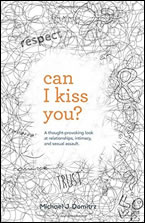Article first published as Book Review: ‘Can I Kiss You? A Thought-Provoking Look at Relationships, Intimacy & Sexual Assault' by Michael J. Domitrz on Blogcritics.
August 30, 2016
Can I Kiss You?
A Thought-Provoking Look at Relationships, Intimacy & Sexual Assault
Michael J. Domitrz
Awareness Publications (2016)
ISBN: 9780997286601
New Book Sets Boundaries Between Intimacy and Sexual Assault
 Can I Kiss You? begins with a surprising title that asks a question seldom heard. Years ago, Mike Domitrz published a book titled May I Kiss You? but he has now come out with a new updated version of the book with a new title that makes it clear you need to ask for permission before attempting physical intimacy with others so you are sure the desire for intimacy is mutual.
Can I Kiss You? begins with a surprising title that asks a question seldom heard. Years ago, Mike Domitrz published a book titled May I Kiss You? but he has now come out with a new updated version of the book with a new title that makes it clear you need to ask for permission before attempting physical intimacy with others so you are sure the desire for intimacy is mutual.
Few guys would think to ask a girl whether he could kiss her, but how many times have we seen movies where a kiss was unwanted and the woman ended up slapping the man’s face? I imagine that the number of unwanted kisses is vastly multiplied in real-life.
The problem is that too many of us rely on body language to determine whether a kiss or touch or even sex is desired by the other person. And worse, many of us cannot properly read body language. How many times have we heard of a girl being raped, only to hear people later say that she was asking for it? That’s body language being completely misread.
Mike Domitrz understands this situation all too well. As a young man, he never would have asked a girl whether he could kiss her. But that all changed the day his sister was raped and he came to understand the importance of asking for permission to be intimate with someone, rather than just assuming the person wants what you want.
Building upon this premise of asking for permission, Domitrz creates a series of chapters with tips, exercises, and role play scenarios to help readers have a happier, healthier, and more mutually positive dating experience.
First is a discussion of why most of us currently don’t ask for permission to kiss or be intimate. Domitrz concludes that we don’t ask because of various fears, including rejection, and he walks us through the reasons for these fears. Later, he also looks at situations like “Pity Dates” where you go on the date so you don’t hurt the person’s feelings, but such an act just causes the situation to snowball from bad to worse since the person may then misinterpret your kindness or pity for genuine affection. Open communication is the key to resolving these situations. By simply asking for permission to kiss or touch someone, and by being honest about your feelings if you don’t want to be kissed or even go out with someone, you can save yourself a lot of trouble later, as difficult as the conversation may initially be. Domitrz gives examples of how to communicate in all these situations so the awkwardness is lessened and the situation is clear to both parties involved.
For such a relatively short book, Can I Kiss You? is packed with a ton of information, including the various roles, such as passive and aggressive, that we play in relationships, the importance of communicating verbally rather than just through body signals, what to do as a bystander if you see someone being taken advantage of, ways to avoid being sexually assaulted, what to do if you are, the roles of drugs and alcohol in sexual assault, and how technology, such as texting and social media, has changed the dating scene.
Each chapter ends with a review of the chapter’s highlights, a “Try This” activity to bring home what was learned in the chapter, and a Bonus section with tips and information broken down for students, parents, and teachers so everyone can be better educated on the differences between intimacy and sexual assault.
One additional point I found refreshing in Can I Kiss You? is that Domitrz has decided to use gender-free plural pronouns like “they” and “their” instead of singular and gender-specific pronouns like “he” and “she.” As a former English professor, this usage would normally make my skin crawl, but Domitrz explains that he has opted for such wording to avoid assigning stereotypical roles to different genders as well as to avoid assuming everyone today is in a heterosexual relationship. He also uses names that could belong to either sex. These changes make it clear that sexual assault is a real issue that could happen to anyone—it’s not just women who are raped or just men who are aggressive. The pronoun usage also reflects the changes in awareness of sexuality in our culture. I applaud Domitrz for this sensitivity that better reflects dating in the twenty-first century.
Sexual assault is a serious crime, and yet miscommunication has caused many people who are otherwise harmless to engage in it. Don’t make the mistake of not asking for permission or other mistakes that could threaten not only your dating life but your future freedom and happiness. Can I Kiss You? can give you the education you need to date successfully.
For more information about Michael Domitrz and Can I Kiss You?, visit www.CanIKissYou.com.
— Tyler R. Tichelaar, Ph.D. and award-winning author of The Children of Arthur series

